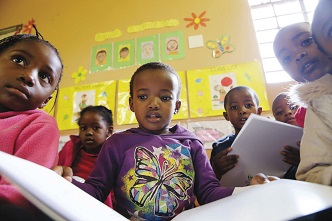Department of Social Development 2021/03/29 - 22:00

The Department of Social Development and Department of Basic Education have told parliament that they will conclude the migration of early childhood development (ECD) by 2022.
The Department of Basic Education Researcher, Janeli Kotze, says ECD is defined as cognitive, emotional, physical, mental, communication, social and spiritual development of children. ECD plays a critical role in preparing a child to thrive in primary and secondary school. ECD can be grouped into three age-groups:
Conception to 2 years (first 1000 days), children aged 3 to 5 years - Stronger Early Learning focus; and Grade R – Entrance to formal schooling.Latest reports by StatSA indicate that access to Early Learning Programmes (ELP) has increased over the past 10 years with 69% of 4 year olds attending an ELP in 2018. There are some major concerns around this data according to DBE and DSD. It is currently not known how many unregistered centres there really are. This makes planning the expansion of Early Learning Programmes problematic.
Registered centres are currently funded through the DSD subsidy at R15 per child for 264 days (means tested). There is a need to get the same funding as Grade RR in schools. Currently there is no reliable data on the number of learners in Grade RR as the majority of RR learners are in ECD centres. It does not mean that ALL 0 – 5 year olds will be going to schools. The hybrid model of using both schools and ECD centres as sites for Grade R will continue and younger children will remain in ELPs
But according to the two departments that is about to change when Grade R becomes compulsory by 2022 in terms of the Basic Education Laws Amendment (BELA) Bill currently being finalised and consulted on.
Grade RR will be declared compulsory in 2030. In schools, following the Grade R roll-out, a conditional grant will be used. There needs to be access to the National School Nutrition Programme (NSNP), Integrated School Health, and Transport. There needs to be curriculum implementation support.
The migration of ECD does not mean that the DBE will employ all ECD practitioners. ECD provision is largely through non-governmental and private sectors, who will remain the employers notwithstanding the shift from the DSD to DBE. It does not mean that suddenly the funding for ECD programmes (birth to 4 years) will increase overnight.
The current funding model will continue in line with the available budgets. However, work is being initiated in line with the NDP and National Integrated ECD Policy to review funding norms and standards. It does not mean that infrastructure will change or be expanded immediately. Infrastructure in ECD provision will be addressed as part of a longer-term plan and in line with the accepted standards and the provisions of current policies. It does not mean that the current ECD service provision, including funding, will be abruptly stopped.
The departments involved in developing a detailed plan for government will ensure that shift of functions happens smoothly with the minimum, if any, disruption in service delivery. It does not mean that ECD practitioners will become educators. In accordance with the provisions of current legislation, the requirements of the South African Council for Educators (SACE) and other policies, ECD educators need to have met at least the minimum professional and academic requirements to move from ECD practitioner to an ECD educator.
A legal mandate is required for DBE to receive and deliver the ECD function. DBE sought the opinion of the Office of the Chief State Law Advisor (OCSLA) which recommended two proclamations that pertain to Chapter 5 and 6 of the Children's Act: Proclamation for Ministers (Presidential proclamation) and Proclamations for MECs (Premier proclamation).
The proclamations have been translated into various South African languages. A Memorandum of Agreement for transitional arrangements between DBE and DSD has been drafted. The next step is for the President to sign the proclamations.
The ECD sector needs strong leadership and coordination. Once the proclamations have been signed, the Minister of Basic Education will convene the Inter Ministerial Committee (IMC) on ECD and clarify the roles and responsibilities of the various departments. DBE will lead on developing an Integrated National Strategy. The Department of Planning, Monitoring and Evaluation (DPME) will assist in ensuring accountability in delivery of services as specified in Integrated National Strategy.
RELATED NEWS
No related news

